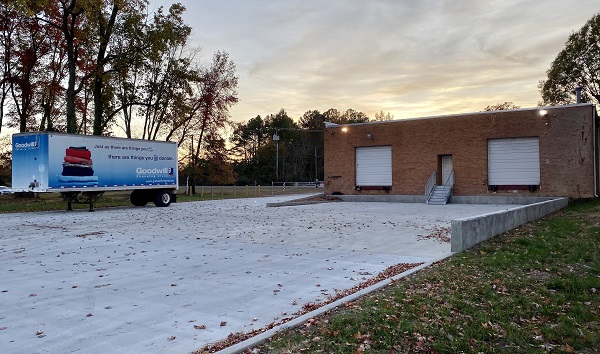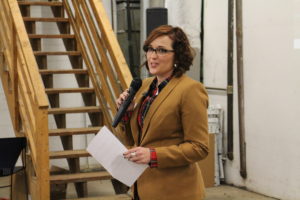
The warehouse building on Goodwill’s Midlothian Turnpike campus, where the trades program was to be housed. (File photo courtesy Goodwill)
Facing higher cost projections, and feeling the financial crunch of the coronavirus crisis, a regional nonprofit has scrapped its plan for a local training facility for workers entering the construction industry, leaving the project’s supporters in search of someone else to take up the cause.
Goodwill of Central and Coastal Virginia has pulled the plug on a Richmond version of its Regional Center for Building and Construction Trades, which it planned to house in a renovated warehouse on the nonprofit’s Midlothian Turnpike campus.

Supporters gathered in the warehouse in November for an event to help raise awareness for the program. (BizSense file)
Modeled after a facility in Hampton that Goodwill has operated since 2015, the Richmond facility was to provide hands-on training for students looking to enter construction trades such as HVAC, electrical and plumbing, with program support from the Community College Workforce Alliance of John Tyler and Reynolds community colleges.
Goodwill CEO Mark Barth, who assumed the nonprofit’s helm in December, said the decision to scrap the program was made in light of escalating cost projections and changes in the project’s scope and timing. He said the project’s cost had quadrupled to more than $1 million above its initial estimate, which had been the basis for a $250,000 capital campaign that kicked off last year.
With only $58,000 of that amount raised, and in light of financial challenges from closing the nonprofit’s retail stores and furloughing more than half of its workers due to the pandemic, Barth said the project was not economically viable.
Noting as well that the facility hinged on a two-year commitment from the community colleges group, Barth said in an emailed statement, “it was not economically feasible to make such a significant investment for such a short time.”
With Goodwill’s 37 retail stores closed since late March, Barth added, “we are not able to generate the revenue necessary to subsidize this program. Our stores generate the funds necessary to pay for our programs.”
Amanda Wheeler, who was invited to participate in the initiative as owner of Chesterfield-based construction firm Riverstone, said the decision came as a shock to her and other supporters.
Wheeler said the project had garnered interest from some big-name potential donors and had secured more than $50,000 in in-kind construction services, with W.M. Jordan Co. and ColonialWebb supporting the renovation. The effort also had received a $125,000 grant from the Robins Foundation for program support – enough, supporters said, to fund two years’ worth of programming for the center.
“It’s very discouraging and disheartening,” Wheeler said.
“They had engaged these big-name potential donors and were getting positive feedback from those guys,” she said. “The center was just starting to gain momentum.”
Wheeler said the turning point for the program coincided with the arrival of Barth, who was named CEO around the same time the campaign was getting going.
Previously the head of a Goodwill in Oklahoma, and at one time CEO of the former Hampton Roads Goodwill that was merged to form the Central and Coastal Virginia chapter, Barth was named in October to replace previous CEO Charles Layman, who retired in January.
“The thing just never grew legs on Goodwill’s side,” Wheeler said.
In his email to BizSense, Barth called the cancellation a “difficult decision” and said all donors have been offered full refunds. He added that Goodwill would continue to provide employment services through credentialing programs as well as intake, recruitment, referrals and job coaching.
Need increasing
Barth said the pandemic has caused all of Goodwill’s workforce development operations to be put on hold, contributing to a financial impact that prompted the nonprofit to furlough 841 of its 1,360 workers regionwide and close its 37 retail stores, sales from which account for nearly 70 percent of its annual operating revenue.
That lost revenue supports its job-readiness skills programs, which also are difficult to maintain in a time of social distancing, Barth said.
“As we look to the future and reopening, we know that we will need to remain flexible and adaptive to serve the needs of our communities – needs which have changed dramatically in just a few short weeks,” he said. Citing unemployment projections of 10 percent or higher through the end of this year, Barth added, “our workforce development services are more in demand than we’ve ever seen before.”
As for the cancelled trades program, some of those who were involved are not giving up on the concept, hopeful that another group might step in to take it on.
Wheeler said she remains supportive of a credentialing program to support her company’s industry. And John Dougherty, a former Goodwill executive who helped guide the project before parting ways with the nonprofit in February, said he’s looking to keep the program alive, though he acknowledged the challenges presented by the economic downturn add to the program’s need.
“Until we see where things are going to go with demand and what the industry needs, there isn’t a plan, just a desire among people who were supporting the initiative to see it come to fruition at some point,” Dougherty said.
“I feel pretty confident that, once we figure out where the economy is going to go, there’s certainly demand and a lot of people that are going to need jobs, and I’m hopeful we’ll be able to make that pathway come back to fruition,” he said.
Dougherty said he couldn’t speak about the nature of his departure from Goodwill, stating only that it preceded the furloughs and wasn’t due to the program’s cancellation.
“We had a change in leadership, and they wanted to go in a different direction,” he said. “There’s been pretty significant change within the organization.”

The warehouse building on Goodwill’s Midlothian Turnpike campus, where the trades program was to be housed. (File photo courtesy Goodwill)
Facing higher cost projections, and feeling the financial crunch of the coronavirus crisis, a regional nonprofit has scrapped its plan for a local training facility for workers entering the construction industry, leaving the project’s supporters in search of someone else to take up the cause.
Goodwill of Central and Coastal Virginia has pulled the plug on a Richmond version of its Regional Center for Building and Construction Trades, which it planned to house in a renovated warehouse on the nonprofit’s Midlothian Turnpike campus.

Supporters gathered in the warehouse in November for an event to help raise awareness for the program. (BizSense file)
Modeled after a facility in Hampton that Goodwill has operated since 2015, the Richmond facility was to provide hands-on training for students looking to enter construction trades such as HVAC, electrical and plumbing, with program support from the Community College Workforce Alliance of John Tyler and Reynolds community colleges.
Goodwill CEO Mark Barth, who assumed the nonprofit’s helm in December, said the decision to scrap the program was made in light of escalating cost projections and changes in the project’s scope and timing. He said the project’s cost had quadrupled to more than $1 million above its initial estimate, which had been the basis for a $250,000 capital campaign that kicked off last year.
With only $58,000 of that amount raised, and in light of financial challenges from closing the nonprofit’s retail stores and furloughing more than half of its workers due to the pandemic, Barth said the project was not economically viable.
Noting as well that the facility hinged on a two-year commitment from the community colleges group, Barth said in an emailed statement, “it was not economically feasible to make such a significant investment for such a short time.”
With Goodwill’s 37 retail stores closed since late March, Barth added, “we are not able to generate the revenue necessary to subsidize this program. Our stores generate the funds necessary to pay for our programs.”
Amanda Wheeler, who was invited to participate in the initiative as owner of Chesterfield-based construction firm Riverstone, said the decision came as a shock to her and other supporters.
Wheeler said the project had garnered interest from some big-name potential donors and had secured more than $50,000 in in-kind construction services, with W.M. Jordan Co. and ColonialWebb supporting the renovation. The effort also had received a $125,000 grant from the Robins Foundation for program support – enough, supporters said, to fund two years’ worth of programming for the center.
“It’s very discouraging and disheartening,” Wheeler said.
“They had engaged these big-name potential donors and were getting positive feedback from those guys,” she said. “The center was just starting to gain momentum.”
Wheeler said the turning point for the program coincided with the arrival of Barth, who was named CEO around the same time the campaign was getting going.
Previously the head of a Goodwill in Oklahoma, and at one time CEO of the former Hampton Roads Goodwill that was merged to form the Central and Coastal Virginia chapter, Barth was named in October to replace previous CEO Charles Layman, who retired in January.
“The thing just never grew legs on Goodwill’s side,” Wheeler said.
In his email to BizSense, Barth called the cancellation a “difficult decision” and said all donors have been offered full refunds. He added that Goodwill would continue to provide employment services through credentialing programs as well as intake, recruitment, referrals and job coaching.
Need increasing
Barth said the pandemic has caused all of Goodwill’s workforce development operations to be put on hold, contributing to a financial impact that prompted the nonprofit to furlough 841 of its 1,360 workers regionwide and close its 37 retail stores, sales from which account for nearly 70 percent of its annual operating revenue.
That lost revenue supports its job-readiness skills programs, which also are difficult to maintain in a time of social distancing, Barth said.
“As we look to the future and reopening, we know that we will need to remain flexible and adaptive to serve the needs of our communities – needs which have changed dramatically in just a few short weeks,” he said. Citing unemployment projections of 10 percent or higher through the end of this year, Barth added, “our workforce development services are more in demand than we’ve ever seen before.”
As for the cancelled trades program, some of those who were involved are not giving up on the concept, hopeful that another group might step in to take it on.
Wheeler said she remains supportive of a credentialing program to support her company’s industry. And John Dougherty, a former Goodwill executive who helped guide the project before parting ways with the nonprofit in February, said he’s looking to keep the program alive, though he acknowledged the challenges presented by the economic downturn add to the program’s need.
“Until we see where things are going to go with demand and what the industry needs, there isn’t a plan, just a desire among people who were supporting the initiative to see it come to fruition at some point,” Dougherty said.
“I feel pretty confident that, once we figure out where the economy is going to go, there’s certainly demand and a lot of people that are going to need jobs, and I’m hopeful we’ll be able to make that pathway come back to fruition,” he said.
Dougherty said he couldn’t speak about the nature of his departure from Goodwill, stating only that it preceded the furloughs and wasn’t due to the program’s cancellation.
“We had a change in leadership, and they wanted to go in a different direction,” he said. “There’s been pretty significant change within the organization.”


I directed a DOL program in the late 70’s sponsored by the local Homebuilders Association which provided 6 weeks of basic training followed by job placement and a 3 year apprenticeship program coordinated with the local schools. The program worked! The Tidewater HBA continues the program in a mutated form training people in apartment maintenance. Perhaps instead of giving people checks to sit at home in their PJs–which is what I’m doing at this very moment but without the taxpayers support–we could look at another such taxpayer funded training program. There is so much apartment construction in the City, along… Read more »
Disappointing. Hopefully the program gains support from other groups or organizations that understand that there is still the need for a skilled construction workforce, now and in the future. Even during this pandemic, the construction industry has been deemed essential and, with the additional safety measures in place, has been able keep it’s workforce employed.
Additional safety measures in place? I am yet to see a single construction worker with any PPE minus a hard hat and presumptive steel toed shoes. There have been plenty of City employees on job sites, not one has worn any PPE from what I’ve seen. Wishful thinking though.